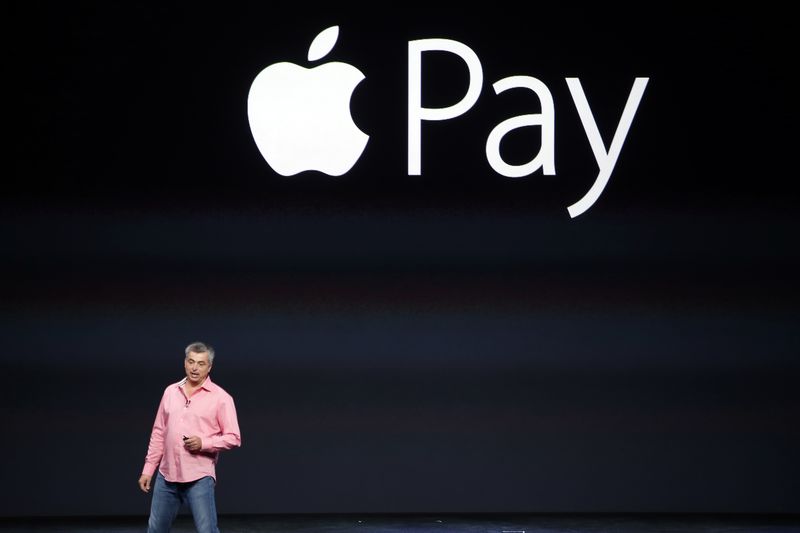By Lisa Baertlein and Arriana McLymore
LOS ANGELES/NEW YORK (Reuters) -Roxanne Ross of Florida is one of a growing number of Americans dodging higher interest rates on credit cards by instead turning to "buy now, pay later" services as they shop for holiday merchandise.
Ross has her eyes on the latest Apple (NASDAQ:AAPL) AirPods for $249. As of Monday, she was considering using Klarna, a buy now, pay later service, to spread the cost across four installments that stretch into next year.
With U.S. credit card balances at record levels and defaults rising, more shoppers than ever are tapping buy now, pay later services on key shopping days to stretch their budgets.
While they can be a tool for shoppers like Ross, who plans to continue taking out weeks-long, interest-free loans she has used for everything from plane tickets to hair extensions - consumer advocates are raising red flags about cash-strapped shoppers who are adding months-long loans with rates that can top out at 36% - the maximum lenders can charge in many states.
Demand for debt counseling services is up significantly from last year, defying the seasonal slowdown experienced during the holidays, said Bruce McClary, spokesman for the National Foundation for Credit Counseling.
The increased use of buy now, pay later loans from providers like Klarna, Affirm, PayPal (NASDAQ:PYPL) and Afterpay "signal an increase of short-term debt on top of the more than $1 trillion in outstanding credit card balances," McClary said.
Shoppers can purchase anything from a $3,253 Jil Sander leather tote bag marked 30% off from luxury retailer Farfetch (NYSE:FTCH), to groceries from Walmart (NYSE:WMT) and Burger King gift cards valued at up to $500 — getting the merchandise before it's fully paid for.
Walmart in 2021 scrapped its layaway program, which allowed people to take home merchandise after completing a series of financed payments. The world's biggest retailer, Walmart replaced that with buy now, pay later options through Affirm, setting the stage for the industry's capture of 5% of total e-commerce worldwide.
Retailers pay fees of anywhere from 2% to 8% of the purchase price to buy now, pay later firms. In comparison, credit card processing "swipe" fees run 2% to 4%.
Klarna's holiday "hot deals" include 51% off the last generation iPhone 14 Pro through Walmart, with a price tag of $699.
Consumer advocates warn that the loans could nudge some shoppers to splurge on jewelry, trendy clothing, video game consoles or appliances they otherwise could not afford. Providers told Reuters they are giving shoppers alternatives to the average credit card now charging over 20% interest, and are only extending loans to people they believe are willing and able to repay.
Credit analysts are also registering concern about the spike in shoppers turning to Affirm, Klarna and other ubiquitous payment schemes for gifts this Christmas, when higher costs for housing and food as well as borrowing on everything from credit cards to car loans squeeze budgets.
"It feels like the holiday debt hangover could be particularly nasty this year," Bankrate analyst Ted Rossman said.
CHARGING 36% INTEREST
The services do check shoppers' credit ratings to determine whether and what rate of interest to charge. Most heavily advertise 0% interest, "pay in four" biweekly installment loans. But at Affirm, for example, interest-free loans accounted for 26% of its products in its latest quarter, while interest-bearing loans stretching as long as five years accounted for 74%, according to a company presentation.
Affirm said consumers see the total cost of the loan, including interest, up front. Unlike some other providers, it said it has no hidden interest charges.
While cash-flush consumers are users, data shows that the typical BNPL borrower "already has more debt, is already more financially vulnerable and under stress," said Jennifer Chien, senior policy counsel for Financial Fairness at Consumer Reports.
Financially vulnerable households that use the loans to buy food and other essentials can see their debt snowball, which puts them in an even deeper hole. And for those shoppers, the loans may not offer a lower interest alternative to the 30% interest rates on the most expensive store credit cards.
But even users who aren't delinquent in their payments can quickly become overextended, raising the risk of spiraling costs, credit analysts warned.
Seattle-area construction foreman Robert Boyer learned the hard way. He has a balance of more than $4,000 from 18 different Affirm buy now, pay later loans on Amazon.com (NASDAQ:AMZN) merchandise, including a $700 drone, a hard hat, work boots and tools.
Boyer, 51, has a previous bankruptcy years ago, and is careful not to run up credit card debt. A recovering addict, he says he got hooked on the instant gratification of buying with small monthly payments of $18 to $40.
"I just wanted the stuff," said Boyer, who admits he didn't read the fine print. In a recent review of the debt, he found that the interest rates on his loans range from about 30% to 36%.
"It's a trap. I was absolutely caught in it," said Boyer, who shared a screenshot showing that one $572 loan at the highest interest rate will ultimately cost him $747.
He intends to repay everything in full, and doesn't plan on taking on any more debt - even though the Affirm app shows he still has $1,630 of purchasing power at Walmart and the same amount at jeweler Zales.
